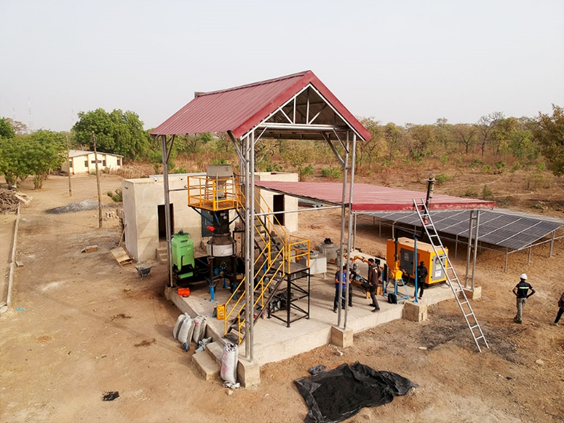About the project
REFFECT AFRICA is an initiative addressing Africa’s energy challenges through innovative and sustainable energy solutions. Prior to the COVID-19 pandemic, the number of people without electricity in the continent was falling. However, in recent years, this trend has been reversing. REFFECT AFRICA focuses on using agricultural and food industry waste as feedstock for renewable energy via biomass gasification technology.
With full-scale demonstrators in Ghana and Morocco, REFFECT AFRICA adapts and optimises these technologies for local biomass resources, such as peanut shells, olive oil waste, and sugarcane bagasse. The initiative provides clean energy to grid-connected and off-grid communities, supports local economies, and contributes to climate adaptation and mitigation efforts.
Description of success
REFFECT AFRICA has successfully implemented two demonstrator projects, one in Ghana and another in Morocco, showcasing the transformative potential of biomass gasification technology.
At the Tuna Technical Senior High School, a hybrid energy system was installed, combining a 20kW biomass gasification plant, a 24kW solar PV plant, and an 80kWh battery storage system. This system produces 100% renewable energy, addressing the school’s electricity needs while promoting a circular economy by utilising peanut shells from local farmers as fuel. The demonstrator installed also includes a purification water system to produce up to 13,000 liters per day of fresh and clean water. This system produces 100% renewable energy, addressing the school’s electricity needs while promoting a circular economy. The gasification plant uses peanut shells from local farmers as fuel which creates a local circular economy. The installation can produce sufficient electricity for the daily needs of the school and also will purify clean tap water for the children. Three steps were taken to realise this initiative:
1. Firstly, civil works to support the renewable installation were built, which took approximately two months. These facilities included a control room, a water lab, a cold room for food storage, and structures to hold the biomass plant and PV plant.
2. Installation of the gasification plant, PV panels, and battery system was conducted by REFFECT AFRICA, including all mechanical and electrical components.
3. The installation's commissioning lasted approximately 15 days. Different operational conditions were optimised, and the quality of the biogas produced was tested. The installation's performance was tested both on and off-grid.
The local community will be involved in the operation of the installation going forward, with REFFECT AFRICA developing training courses to ensure long-term operational sustainability and local sustenance.
Click here to watch a video on the Ghana Demonstrator

Figure 1: Tuna Technical Senior High School
REFFECT AFRICA have installed a biomass gasification plant at the Zoyout Essaouira Cooperative mill in Morocco, marking the second agro-industrial waste plant commissioned in the continent by the project. The biomass gasification plant uses olive tree pruning and dry olive pomace, a sub-product from the olive oil process. The system can work on-grid and off-grid and produces 60-65kW of electric power, 150 kW of thermal power and 10-15 kg/h of biochar which is used to improve soil fertility and agricultural productivity of the local farmers. The demonstrator highlights a sustainable integration of energy, water, and agriculture, turning agricultural waste into valuable resources for local communities.
Click here to watch a video on the Morocco Demonstrator

Figure 2: Zoyout-Essaouira olive oil mill
Highlights
Demonstrated the use of biomass gasification technology to provide sustainable and renewable energy for African communities.
Addressed energy shortages in remote areas with flexible on- and off-grid solutions, utilising local agricultural waste and returning benefits to the community.
Installed full-scale demonstrators in Ghana and Morocco, offering replicable models for energy access.
Provided training to local community members, building capacity for maintaining and operating energy systems.
Produced biochar from biomass waste to enhance soil fertility and agricultural sustainability.
Outputs
The successes of the REFFECT AFRICA project have been the subject of a number of articles, including:
Together with the Bio-FlexGen project, a policy brief was developed on Biomass waste-to-energy.
REFFECT AFRICA have published a guide on European-African project management which informs and shares lessons on collaboration across cultures.
Impact
REFFECT AFRICA has delivered sustainable energy solutions to communities with limited or unreliable access to electricity. By converting agricultural waste into renewable energy, the project stimulates local economies, reduces dependence on imported fuels, and addresses critical energy challenges. The use of biochar improves soil quality and water retention, promoting sustainable agriculture and enhancing food security. The demonstrators in Ghana and Morocco serve as replicable models for similar projects across Africa, providing a framework for integrating energy, water, and agricultural solutions. The project also builds technical skills within communities, supporting long-term energy resilience.
Lessons
Using locally available biomass makes the technology more accessible and fosters sustainable community engagement and ownership.
Engaging with the local community early and consistently was crucial for acceptance and support of the project. Many community members were unfamiliar with biomass gasification and the benefits of renewable energy solutions.
Understanding and involving community needs in the planning stages fostered a sense of ownership within the local community, which is essential for long-term sustainability of the initiatives.
Systems that operate both on-grid and off-grid are essential, particularly in regions with inconsistent electricity supply. The flexibility helped to maintain reliable energy access, enhancing resilience and adaptability.
Training locals in the operation and maintenance of the technology is critical, and capacity-building reduced the community’s dependency on external support.
Other information
The REFFECT Africa project demonstrates experience in facilitating knowledge exchange and collaboration across different cultural and socio-economic contexts, particularly in Africa. The project demonstrated the importance of early and continuous community engagement to ensure acceptance and long-term sustainability. Training and upskilling local communities in renewable energy technologies reduced dependence on external expertise, reinforcing self-sufficiency in energy access projects. Lessons from this work inform broader approaches to stakeholder engagement in international energy transitions.

